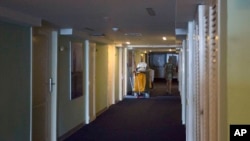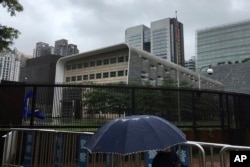The United States has pulled out two more of its workers from its embassy in Cuba and is testing them for possible brain injury, three U.S. officials told The Associated Press on Friday, amid concerns they may have been affected by mysterious health incidents harming U.S. diplomats in Cuba and China.
The two individuals are considered "potentially new cases'' but have not yet been "medically confirmed,'' a State Department official said. Two other officials said the individuals had been brought for testing to the University of Pennsylvania, where doctors have been evaluating, treating and studying Americans affected in Cuba last year as well as almost 10 new possible cases from a U.S. consulate in China.
The officials weren't authorized to comment publicly and requested anonymity.
If confirmed by doctors to have the same condition, the two individuals would be the 25th and 26th confirmed patients from the bizarre incidents in Cuba that were first disclosed last year and have been deemed "specific attacks'' by the U.S. government. The United States has said it doesn't know who is behind it, but has argued Cuba is responsible for protecting all diplomats on its soil. Cuba has denied any involvement in or knowledge of what may have caused the injuries.
Stoppage was suspected
Until Friday, the most recent suspicious incidents disclosed by the U.S. in Cuba had been in August 2017, leading many to suspect that the incidents had stopped.
The confirmed Cuba patients have been found to have a range of symptoms and diagnoses including mild traumatic brain injury, also known as concussions. Unexplained sounds and vibrations that accompanied the symptoms initially led investigators to suspect a sonic weapon, although an interim FBI report in January said no evidence had been uncovered that sound waves could have damaged the Americans' health, the AP reported.
The potential new cases come as the U.S. has being issuing health alerts to Americans in China after a worker at the U.S. Consulate in Guangzhou reported symptoms and strange sounds and was flown to the U.S. That worker was then medically confirmed to have "suffered a medical incident consistent with what other U.S. government personnel experienced in Havana, Cuba,'' the State Department has said.
The U.S. Embassy in Beijing on Friday sent an alert, its second in two weeks, to Americans living or traveling in China, and urged them to seek medical help in the event they suffered any "unusual, unexplained physical symptoms or events, auditory or sensory phenomena, or other health concerns.'' It called for people to be attentive of symptoms including "dizziness, headaches, tinnitus, fatigue, cognitive issues, visual problems, ear complaints and hearing loss, and difficulty sleeping.'' It advised them "not to attempt to locate the source of any unidentified auditory sensation. Instead, move to a different location.''
China has said it had looked into the Guangzhou case but came up with no clues about the cause of the symptoms. The Foreign Ministry said Thursday that the U.S. had not formally raised the matter with Beijing.
The State Department has sent a medical team to China to offer medical screenings to all American government workers and family members who want them. The team arrived in Guangzhou last week to begin evaluating Americans and will go next to Beijing.
Most sought exams
Of the roughly 170 American consulate staffers and family members in Guangzhou, about 150 sought the offered preliminary medical examinations, according to officials familiar with the process. The officials stressed that some of them may not have experienced any symptoms and were having the tests done protectively. Although the vast majority were cleared, eight people were referred to the University of Pennsylvania for additional testing, the officials said.
Unlike the relatively small U.S. mission in Cuba, the U.S. diplomatic presence in China is large with representatives from 33 different federal agencies employed at the embassy in Beijing and the five consulates on the mainland: Chengdu, Guangzhou, Shanghai, Shenyang and Wuhan. As of May 2017, when the State Department inspector general's office conducted its last inspection of the missions in China, almost 900 Americans worked at them, including 168 who were hired locally.
Guangzhou is one of the most important of the U.S. diplomatic outposts in the country. The consulate opened months after the establishment of diplomatic relations between Beijing and Washington in 1979 and moved to its new purpose-built facility in 2013. It serves four southern provinces with a combined population of more than 204 million and processes more than 1 million visa applications of all types annually. It is also the only U.S. diplomatic installation in China authorized to process immigrant visas and handle adoptions.





